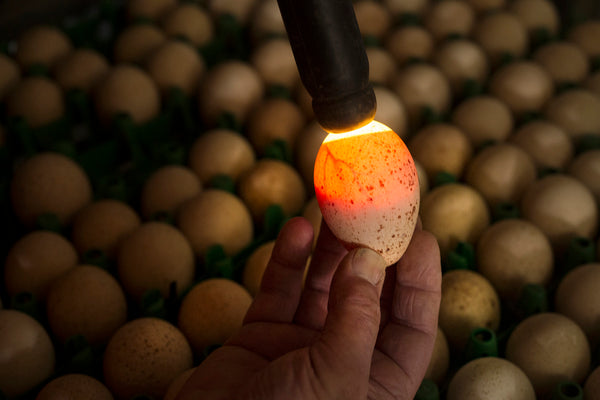
Hatching Heritage Chickens at Chosen Farm, a member of the Good Shepherd Poultry Network
A heritage chicken lays an egg and Jed Greenberg gathers it, but he never washes it. By not washing Jed maintains the bloom on the egg, a liquid that develops when the egg is laid. The bloom dries in seconds, but it covers the entire shell thus protecting the chick from bacteria. Washing, Jed says, lowers fertility and drives dirt into the egg which contaminates the inside. Unwashed eggs can be kept in a 60-70 degree room for 7-10 days where they lie dormant — after that fertility drops. Jed stores his eggs in plastic egg crates with the bulbus end up.
The eggs are then moved into the incubator where the chicks start to develop. Jed will place about 2000 at once, keeping the incubator at precisely 99.8 degrees and 40% humidity. The incubator moves the eggs around side-to-side, imitating the behavior of the hen who flips her eggs regularly. By moving the egg, the embryo does not stick to the shell. After 18 days of rocking, eggs are moved to the hatcher where they remain still for the next 3 days at 99 degrees and 60% humidity. The embryo development does not start until the egg reaches the incubator so older eggs that were held at the beginning still hatch at the same time as the younger ones. Chicks will now start to pop out of their shells!
Once born, chicks are then ready to move to a new home! Jed keeps some birds on his farm and others are delivered to contract farmers by truck or via the US Postal Service — the fluids from an egg can sustain a chick in transit for up to 2-3 days. Jed delivers about 1000 chicks every 8 weeks but to meet demand he must grow about 2000 eggs as a successful hatch rate is about 55%. Between the egg laying and the hatch, Jed can see how well things are going between days 5 and 12 when eggs can be candled to observe how many are actually becoming embryos, a process called candling.
Baby chicks are kept in brooder barns where they run around on sawdust for about 6 months at which time they start to produce eggs themselves. Jed now has 300 birds producing eggs for his heritage and kosher market lines, 10% of which are males — only 30 males for 270 females. As his market grows, more and more contract farmers will come on board to grow more birds thereby increasing the population counts of rare heritage breeds.
